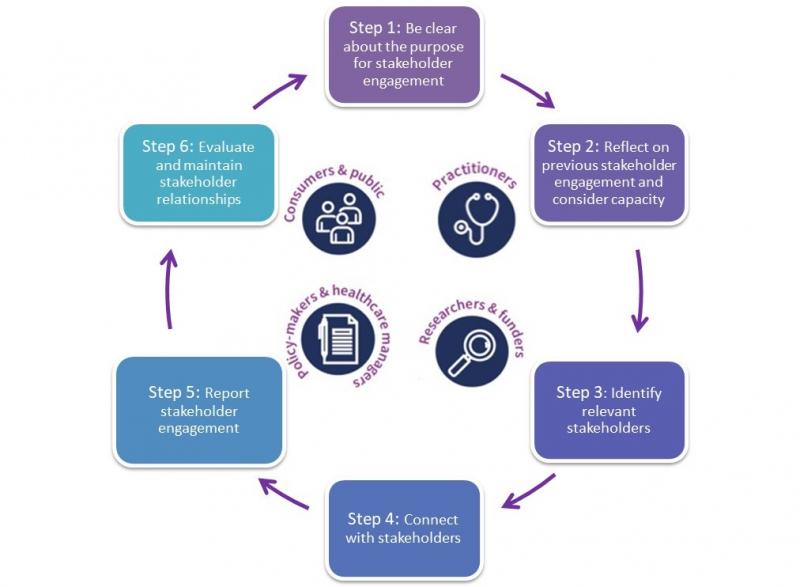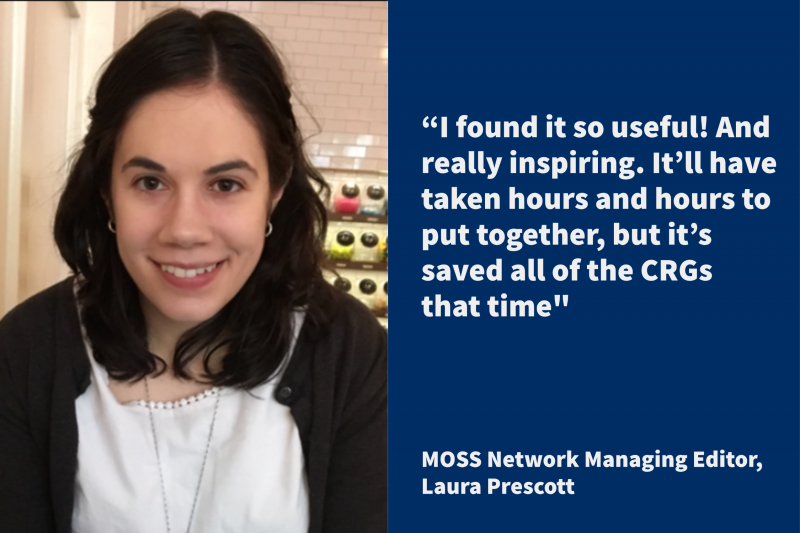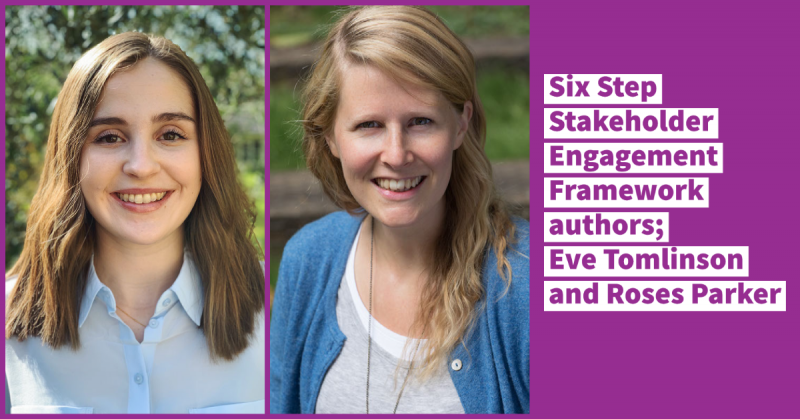

Who are my stakeholders? What can they offer me? What can I offer them? And how do I begin engaging them? These were some of the questions tackled by NIHR Network Support Fellows Roses Parker (Cochrane Musculoskeletal, Oral, Skin and Sensory Network; MOSS) and Eve Tomlinson (Cochrane Cancer Network) as they embarked on stakeholder engagement projects for their networks, leading to their collaboration on the production of a Six-Step Stakeholder Engagement Framework.
Why does stakeholder engagement matter?
Engaging the end-users of Cochrane reviews is vital to improve research relevancy and quality, and increase the likelihood that Cochrane evidence will be used in clinical decision making. Stakeholder engagement can be beneficial in all research activities conducted by Cochrane Review Groups (CRGs), including one off events (such as the co-production of a systematic review), broader projects (such as the prioritisation of systematic review topics), and stakeholder engagement over a sustained period covering several different areas (such as to support the direction or focus of a CRG and to disseminate research).
What we did
We both recognised that there is a lot of experience with stakeholder engagement in Cochrane, but sometimes the information is not shared between groups. We wanted to explore this within our Cochrane Networks and see what we could do to help improve stakeholder engagement.
Roses writes:
In the MOSS Network, I conducted interviews with each review group aiming to:
- Understand the current stakeholder engagement work within MOSS,
- Share examples of stakeholder engagement work within MOSS, and
- Gather information to inform the next steps in stakeholder engagement work within MOSS.
I then conducted interviews with consumer representatives from each review group aiming to:
- Understand the experience of consumers when working with MOSS, and
- Gain their perspectives on the stakeholder engagement framework in a draft form
Eve writes:
- In the Cancer Network, CRGs wanted to know more about other CRGs’ relationships with stakeholders and requested support with improving stakeholder engagement.
- I surveyed each CRG about their experiences with stakeholder engagement and shared the findings in a Network meeting in November 2019.
- Discussion in the Network meeting, along with stakeholder information given by CRGs, informed a Cancer Network stakeholder mapping project in which I identified relevant stakeholders, gathering information for each CRG and the Network overall. Since then, I have been working with Cancer CRGs to use the stakeholder maps and engage new stakeholders as required.
Together, we used our experiences to collaborate and produce:
- A report summarising stakeholder engagement in the MOSS Network: This report details the experiences of each MOSS CRG. These examples offer both inspiring reading of large-scale stakeholder engagement, as well as examples of innovative stakeholder engagement when resource is scarce.
- A range of consumer case studies: The case studies provide insight into how consumers are recruited, types of activities they engage in, and some tips on what to do/or not to provide them with a positive experience. We're looking forward to sharing the final documentation soon!
- A Six-Step Stakeholder Engagement Framework:
- The framework is based on insights from both the MOSS Network and the Cancer Network, and a wide array of individuals from Cochrane.
- It is formatted around the four key stakeholders identified in the Cochrane Knowledge Translation Framework and its key audience is Research Groups (such as CRGs) embarking on stakeholder engagement.
- It suggests that users consider six key steps (see Figure below) in stakeholder engagement.
- It aims to cover common and key steps in the engagement process, provide a helpful structure, and raise important considerations for stakeholder engagement, whilst encouraging modifications to be made based on the individual Research Group’s circumstance. We are keen to acknowledge that there is not a neat ‘one size fits all approach’ to stakeholder engagement but many ways researchers could engage stakeholders in their work!

Next steps
We hope that by sharing experiences of stakeholder engagement and providing a methodical and pragmatic framework to support the process, this work will be helpful to Groups within and even beyond Cochrane in planning and implementing successful stakeholder engagement.
We are keen to use this work to open up a discussion about stakeholder engagement across Cochrane. We have had some great feedback already! A Managing Editor in the MOSS Network writes:

Acknowledgements
We would like to acknowledge the input of CRG members in the MOSS Network who gave their time to be interviewed about their experiences with stakeholder engagement. We would also like to thank the members of the Cancer Network who have worked with Eve on stakeholder mapping and engagement. Thanks also to the following people for their help in bringing this work together: Peter Tugwell, Karen Head, Alex Pollock, Neal Haddaway, Jo Anthony, Katie Abbotts, Richard Morley, Anne Littlewood, Ruth Foxlee, Sarah Elliott, Tom Concannon, Elie Akl, Janet Gunderson, Megan Prictor, Chrissi Kelly, Stella O’Brien, Amanda Roberts, the Formalising Strategic Partnerships Working Group, and members of the Multi Stakeholder Engagement (MuSE) Consortium.

Resources:

